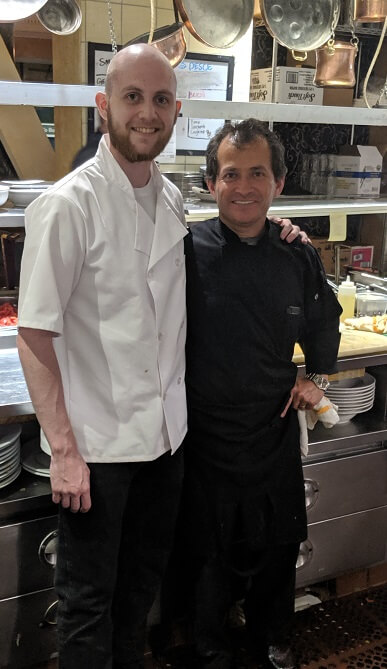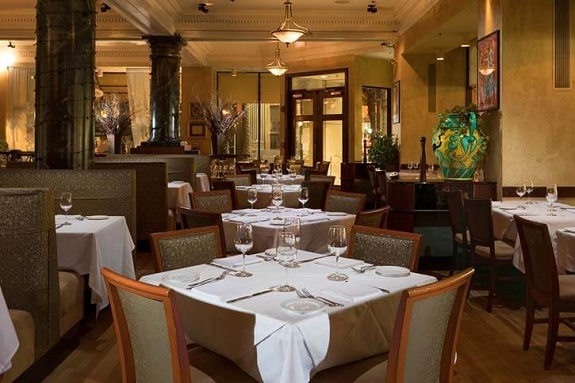
CASA mentor Chef Walter Cotta at L’Opera (on right) with CASA graduate Joey Mendes
Chef Walter Cotta knows all about learning on-the-job and working one’s way up in the culinary arts. Starting out working in a restaurant as a dishwasher, Walter’s tenacity and passion for learning, as well as his in-born talent for cooking, enabled him to rise through the ranks, from dishwasher, to line cook, to ultimately Executive Chef at the upscale, award-winning Italian restaurant
L’Opera, in Long Beach, California.
We recently spoke with Chef Cotta to garner his insights on what it takes to succeed as a chef, discuss in-industry training, and talk about recent CASA graduate, Joey Mendes. Enjoy!
What qualities are the most important ones to have if one wants to become a chef?
“To become a chef, you have to have two things. You have to love cooking and you have to have the time to do it. Because actually being a chef, you’re not just only cooking or coming up with the nice recipes, it’s about time. It’s a long day, you know? I think we start around 8:30 in the morning until the day is over…You’re actually married to this career.”
How did you become a mentor for CASA?
“First I got an email, and then I got a phone call…They explained to me how it works. I thought it was great. What was exciting, back in my country I was supposed to become a teacher for physics and math. So actually, it was the opportunity for me to teach and grab that part that I left in my country, bring it over here, and start teaching again. And so, that’s great. I think it’s a great concept. Now, I can teach them [CASA students] everything from how to handle the knives to create a full menu…My students have a great future in front of them.”
Recent CASA Gourmet Chef graduate Joey Mendes has gone far, fast and is already cooking on-the-line at a well-known restaurant. What can you tell us about Joey as a student extern?

L’Opera restaurant, a CASA mentor-externship location
“Joey is a great guy. When he came to me, he said he didn’t have any experience in a kitchen; he’d never been in a professional kitchen before. He was working at a big warehouse on the graveyard shift. And I explained to him, ‘You know, this is a hard job, this is how we’re going to work.’ I showed him everything in my kitchen, I gave him a tour of the restaurant, and he loved it. And one thing that Joey has is that he will put in extra to whatever he does. He will give 100% all the time…He was here three, four days a week, almost all day. That enthusiasm that he has to learn, [and] he really loves the kitchen, I think he found what he really was missing in his life…He really got into it right away.”
In your opinion, how can CASA students maximize their learning and growth during their culinary arts externships, whether they’re with you or training inside of another restaurant kitchen?
“Well actually, every chef is different, you know? I have my way to teach. Other chefs, they have their own ways to teach… [Students] choose the restaurant where they want to go and learn, and give 100%. They should try to [keep an] open mind to understand everything we tell them to do, and how to do it…The good thing about L’Opera for the students I have is that they can learn from A to Z, because we do everything from scratch. Our pastas, our raviolis, everything. We have a pasta lady starting in the morning, making the pastas fresh and the ravioli fresh. I have my bread guy, we do our own bread. We do our own cakes. It all depends on how far they want to go with us, you know? There’s no limit.”
Homemade pasta? That sounds delicious! Any last words for people thinking of becoming a culinary extern with CASA?
“Being a chef is not just being in the kitchen. You can do a lot of stuff. You can be a spokesperson, you can do consulting…As far as you have the ambition, like they say, the sky’s the limit.”
Learn more about
CASA Schools Gourmet Chef Program.
* * * * *



